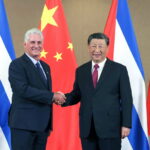
A report released by the Washington -based Atlantic Council has pointed out that the United States is in danger of losing geopolitical, economic and normative influence on the technological dispute with China if they maintain a “complacent” posture compared to the global south.
The document states that developing countries should become central actors in the emerging technology sector in the coming decades, both as consumers and suppliers and innovative.
The report also projects a strengthening of these countries’ relationships with China, which can compromise US strategic interests on various fronts.
“Global South will have an increasingly critical role in advanced technology in the coming decades,” says the text. “The United States cannot afford to underestimate the role that will be played by the Global South in the formation of global technological competition.”
Global South Potential and Risk of Isolation
The report estimates that Global Southern countries concentrate 85% of the world’s population and represent approximately 40% of global gross domestic product.
According to the Atlantic Council, these nations will be at the center of decisions on international standards, supply of inputs and direction of demand in sectors such as artificial intelligence, semiconductors and advanced communications.
“If this is not done, China can promote its geopolitical, economic and technological interests around the world, allowing Beijing to shape global norms and technological standards without impediments, thus impairing the interests of the United States and its allies,” the document warns.
The text also criticizes the predominant approach in Washington, according to which the technological advantage is analyzed mainly under military and economic lenses.
According to the report, this perspective ignores the importance of international dissemination of new technologies, an aspect considered essential in the current competition.
“However, the global diffusion of emerging technologies is equally important. Unfortunately, it is often neglected,” the report says.
Chinese actions and American response
In recent decades, China has intensified its presence in the global south through actions such as academic exchange programs, technical training and media cooperation.
According to the report, these initiatives serve geopolitical purposes by reducing US influence and facilitating the insertion of Chinese companies in foreign markets.
The document argues that the United States needs to understand more depth the demands and technological priorities of developing countries.
It also points out that Chinese companies have been successful in adapting their products and services to local conditions, a strategy that the United States has not yet adopted on a comparable scale.
“The strengthening of US relations with South Global would offer the US significant opportunities through the expansion of market access, fostering cutting -edge talent, promoting innovation and advancement of shared economic and geopolitical goals,” says Think Tank.
Geopolitical context and tariffs
The publication of the report occurs during the same period as the US government announced new commercial tariffs, initially proposed by former President Donald Trump and currently suspended for 90 days.
Atlantic Council estimates that such measures may disproportionately affect developing countries, which occupy a relevant position in global value chains.
China, in turn, has intensified its diplomatic articulation. In the week before the report, Chinese President Xi Jinping visited Vietnam, Malaysia and Cambodia as part of an agenda focused on the expansion of international support to Beijing’s positions, including in the context of the tariffs imposed by Washington.
Artificial intelligence as a strategic axis
Artificial intelligence was pointed out in the report as one of the main areas of the dispute between China and the United States. The text points out that the development of AI models involves structural choices that reflect distinct governance systems and forms of governance.
According to Atlantic Council, the competition in this sector transcends market dominance and expresses ideological divisions between the two countries. Both consider that the advancement of technology will have long -range impacts, both on the economic order and on political governance.
“The competition went beyond the domain of the market and reflected deeper political divisions and governance, as the training of AI models was an” inherently loaded exercise of values, “the text says.
The report also indicates that, given the scarcity of alternatives, many countries are resorting to Chinese artificial intelligence systems, even with security concerns, which could provide China access to databases that western companies could not achieve.
With this, “China will have a huge margin of maneuver to shape the adoption and global use of AI”, concludes the document.
Strategic recommendation
The report considers “imperative” that the United States and its allies reformule its external policies focused on the global south.
The proposal includes increased investments in technological cooperation, adaptation of services to local needs, expansion of exchange programs and greater attention to the creation of global technical standards.
The Central Recommendation of the Atlantic Council is that the United States government expands its presence and influence in these regions to prevent isolation in sectors considered critical for geopolitical balance in the coming decades.
With information from SCMP
Source: https://www.ocafezinho.com/2025/04/20/think-thank-do-tio-sam-admite-avanco-tecnologico-da-china-e-possivel-derrota-dos-eua/

